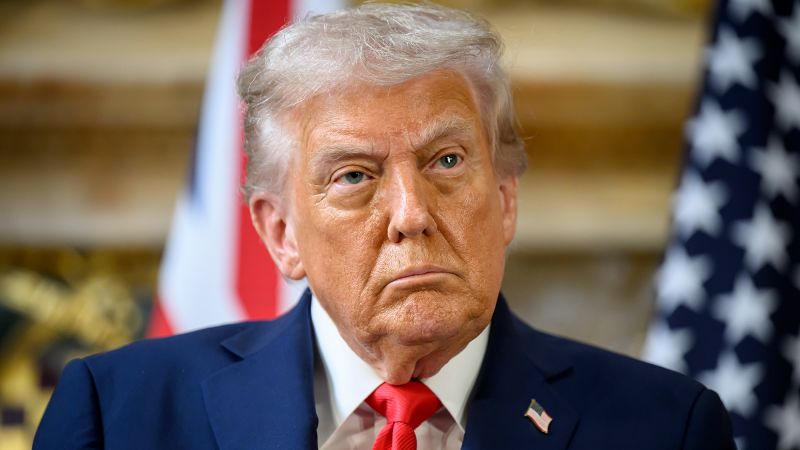Why Trump and his FCC chairman Brendan Carr’s threats against TV station licenses are ‘aggressive yet hollow’

President Trump keeps threatening the licenses of local TV stations, but his government has limited power to follow through on those threats.
The FCC has not denied any license renewal in decades. And any move to revoke a station license would result in lengthy, protracted legal challenges. “But the threats are the point,” as the FCC’s lone Democratic commissioner, Anna M. Gomez, wrote on X this week.
In other words, Trump can’t actually stop local stations from broadcasting shows he doesn’t like, but he can use his bully pulpit to pressure media companies into submission and self-censorship.
Ex-Disney CEO Michael Eisner summarized it well in an X post on Friday that FCC chair Brendan Carr’s recent threat over “Jimmy Kimmel Live!” was “aggressive yet hollow.”
Eisner took a shot at current Disney CEO Bob Iger’s decision to suspend Kimmel’s show, asking, “Where has all the leadership gone? If not for university presidents, law firm managing partners, and corporate chief executives standing up against bullies, who then will step up for the first amendment?”
Iger’s next move vis-à-vis Kimmel is unclear. The late-night show has been off the air since Wednesday as ABC tries to find a path forward.
The Kimmel drama has highlighted the Trump administration’s extraordinary efforts to crack down on entertainment and news content that the president disfavors.
The FCC, the once-independent federal agency that regulates broadcasters, is now following Trump’s media-bashing lead.
While yanking a license isn’t a legal option for the FCC, the agency does have one powerful point of leverage over the stations it regulates. The leverage exists every time a TV or radio station owner wants to acquire or transfer a station license. The FCC has the power to approve or reject such deals.
That’s why Paramount, the owner of the CBS network and many local CBS stations, was so vulnerable to Trump’s pressure earlier this year. Paramount needed FCC chair Brendan Carr’s approval to complete a merger with Skydance Media. Paramount executives suspected that Carr delayed his review of the deal while Trump’s lawyers negotiated with Paramount lawyers to settle a lawsuit Trump had filed over the CBS newsmagazine “60 Minutes.”
Paramount ultimately agreed to pay $16 million toward Trump’s future presidential library to make the legally dubious lawsuit go away. Within a matter of days, Carr allowed the Paramount Skydance deal to go forward, though he insisted the review process was unrelated to the settlement.
The same dynamic is on display now as Disney, the owner of the ABC network and some local ABC stations, tries to solve its late-night TV problem.
Nexstar and Sinclair
The first TV station owner to speak out against Kimmel on Wednesday was Nexstar, which has about two dozen ABC-affiliated stations across the country.
Many industry analysts pointed out that Nexstar is about to seek FCC approval for a proposed merger with another station group owner, Tegna.
The merger would boost Nexstar’s share of the local TV market and exceed the current legal limit, requiring an FCC waiver or rule change from Carr.
Nexstar has denied that its executive team spoke with anyone at the FCC before deciding to condemn Kimmel and preempt his show. But the executives were almost certainly aware of Carr’s public remarks about station licenses. Their justification for taking action on Wednesday evening closely mirrored Carr’s own comments earlier in the day.
Within hours, another big station group owner, Sinclair, put out an even more forceful statement against Kimmel. Sinclair was reportedly interested in placing a rival bid for Tegna, and has recently said it may sell some of its stations, so it also has reason to stay in the FCC’s good graces.
Thus, it’s little wonder why Nexstar and Sinclair slathered affection on Carr and Trump when the Kimmel controversy erupted. The protracted government review of the Paramount merger signaled to the media marketplace that the Trump-era FCC is operating transactionally.
Public interest groups and Democratic politicians have cried foul — Senator Edward J. Markey on Friday said the FCC has become the “Federal Censorship Commission” — but Carr has embraced the fight, just like the president who appointed him.
License threat reality check
Lawyers and analysts have speculated that some major media companies will hesitate to pursue mergers and acquisitions for the time being due to the Trump administration’s aggressive approach. In addition to FCC review of station transfers, mergers could also trigger Justice Department examination.
But fears about the government revoking an existing license, or forcing a station to be sold to a Trump-approved buyer, are more of a stretch.
“Taking away a broadcast license has so many legal obstacles and takes so long that the FCC doesn’t even try,” public interest lawyer Andrew Jay Schwartzman told CNN. “The only exceptions are small radio stations and involve felonious conduct or severe misrepresentations in the application reports to the FCC, and never about program content.
“No large broadcaster has lost a license since the 1980s,” he said, “and that was for bribery.”
Trump and Carr could try anyway, but the legal battle would drag on for years, and the “Communications Act gives licensees broad protection,” he added.
Congress could move to change the law and expand the FCC’s regulatory powers, though Republicans are more often aligned with efforts in the opposite direction. The conservative Wall Street Journal editorial board, for example, said in a Thursday editorial that the government should take the FCC “out of the business of regulating media.”
Even some of Trump’s fiercest allies agree. “If the government gets in the business of saying, ‘We don’t like what you, the media, have said. We’re going to ban you from the airwaves if you don’t say what we like,’ that will end up bad for conservatives,” Senator Ted Cruz said Friday.



